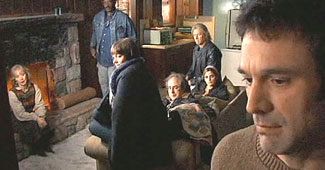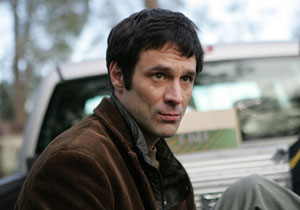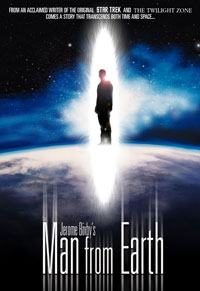John Oldman (David Lee Smith), who is the titular character in The Man from Earth (2007), is giving up a decade's tenure to "move on" to another life. His friends are curious, alarmed, & hopeful for him, though in no way understanding why he won't say why or where he's going.
 His friends show up at his cabin for an impromptu farewell gathering. John's so mysterious about what he's up to, they can't help but pry. His friends show up at his cabin for an impromptu farewell gathering. John's so mysterious about what he's up to, they can't help but pry.
He's so moved by their sincerity of friendship that he's tempted to reveal to them who & what he really is, though in the past he's always just moved on without farewells to anyone.
John claims to be, or believes himself to be, a man born in the Upper Paleolithic, still alive one-hundred-forty-thousand years later. Very much in the manner of a stage play, an intellectual discoruse erupts through John's confession, with his educated friends questioning & arguing the ramifications & possibilities of his claim.
The stage play tone, all but restricted to one room with minimal set decorations, allowed for a science fiction film of idea rather than events, & very low budget. It's too bad the cinematographer made it look like every penny not spent, but we'll forgive its telefilm "look." The characters are so well written, & just as well played, as to seem entirely reals. They are sufficiently ingriguing as personalities that the film is pretty much non-stop successful.
 They are mostly men of science (more or less); a theological professor & one angry zealously religious woman; & so on, each representing various perspectives on more or less the level of symbolism. Still, they are never mere cyphers. They are mostly men of science (more or less); a theological professor & one angry zealously religious woman; & so on, each representing various perspectives on more or less the level of symbolism. Still, they are never mere cyphers.
At one level they're self-important chumps sitting around just being educated nabobs proving how smart they think they are. On another level they're just regular folks confronted by an enormous mystery & chatting their way through it as best they can.
For the bulk of the film there's no evidence that what John claims to be true could be so. It's left open-ended whether he's delusional, a wicked prankster unsettling his friends before abandoning them forever, or actually an immortal Cro-Magnon surviving from prehistory.
One complication plays into religion in a manner so cornpone that the film nearly shoots itself in the foot over it, but for a percentage of the audience this silliest moment may well seem like the coolist bit. But "bit," shtick, routine, is all it is.
After all the rational possibilities are fully weighed & no conclusion made in the minds of his guests, & the majority of the cast has exited the stage, for those remaining there is yet one surprise that cinches the whole matter. No sense revealing it here, except to say how, for me, the author's attempt to have a "big" moment & provide a definitive answer to the mystery was mere melodrama the film could've done without.
This script itself is a genuine tour de force in constructing a single conversation sufficiently captivating to sustain a shortish feature without ever being downright dull. It was the last work by science fiction author Jerome Bixby, written literally upon his deathbed, posthumously produced by his son.
Bixby wrote many refined, intelligent s-f stories, but will always be best known for his 1953 short story "It's a Good Life," which in 1961 became one of the most famous episodes of The Twilight Zone, starring Billy Mumy as the horrific little boy who can change reality upon any whim, remade in Twilight Zone: The Movie (1983).
copyright © by Paghat the Ratgirl
|

 His friends show up at his cabin for an impromptu farewell gathering. John's so mysterious about what he's up to, they can't help but pry.
His friends show up at his cabin for an impromptu farewell gathering. John's so mysterious about what he's up to, they can't help but pry. They are mostly men of science (more or less); a theological professor & one angry zealously religious woman; & so on, each representing various perspectives on more or less the level of symbolism. Still, they are never mere cyphers.
They are mostly men of science (more or less); a theological professor & one angry zealously religious woman; & so on, each representing various perspectives on more or less the level of symbolism. Still, they are never mere cyphers.